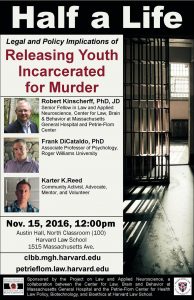CLBB’s Dr. Robert Kinscherff offers commentary on the changing landscape of juvenile justice, especially for offenders who were previously serving life sentences without parole. In this new FRONTLINE documentary, “Second Chance Kids”, he discusses the implications of the Supreme Court ruling that changed everything (Miller v. Alabama) and the role neuroscience research played in shaping such a monumental decision. The following article (also quoting Dr. Kinscherff) accompanied the FRONTLINE documentary.
Continue reading »
WATCH — Second Chance Kids
- Category: Events
- Tags: adolescent brain | juvenile justice | miller v. alabama | robert kinscherff
- Date: May 2, 2017
- Author: FRONTLINE
States Raising the Age for Adult Prosecution Back to 18
In this article by the American Bar Association Journal, CLBB’s Dr. Judith Edersheim offers insight into how adolescent brain development research has propelled the argument against incarcerating teens with adults. After describing the unique neurodevelopmental occurrences that are a feature of adolescence — and how they might influence behavior –, she comments on the dangers of incarcerating teenagers with older adults:
“If you don’t provide an adolescent with an opportunity to develop a social competency or self-esteem, if you don’t put them in contact with pro-social peers, then you’re setting trajectories which actually might persist through adulthood. Adolescents are really these neurologic sponges for their environment.”
Read the full article, “States Raising Age for Adult Prosecution Back to 18”, published by the ABA Journal on February 1, 2017.
- Category: Press
- Tags: adolescent brain | brain development | judith edersheim | juvenile justice
- Date: February 1, 2017
- Author: American Bar Association Journal
You’re an Adult. Your Brain, Not So Much.
CLBB Faculty Member Leah Somerville and her work on adolescent development are featured in the following article, which highlights the difficulty in determining a distinct line between adolescence and adulthood. Additional coverage about how her work intersects with the CLBB can be found here.
By Carl Zimmer | The New York Times | December 21, 2016
Leah H. Somerville, a Harvard neuroscientist, sometimes finds herself in front of an audience of judges. They come to hear her speak about how the brain develops.
It’s a subject on which many legal questions depend. How old does someone have to be to be sentenced to death? When should someone get to vote? Can an 18-year-old give informed consent?
Scientists like Dr. Somerville have learned a great deal in recent years. But the complex picture that’s emerging lacks the bright lines that policy makers would like. Continue reading »
- Category: News
- Tags: adolescence | brain development | juvenile justice | Leah Somerville
- Date: December 21, 2016
- Author: The New York Times
WATCH — Half a Life
Youth convicted of murder ordinarily serve decades in prison before they complete a sentence or are paroled. At the time of release, many of them have spent at least half of their entire life and all of their adulthood incarcerated with adults in prisons. What are the outcomes for these youth when released in adulthood? Do they commit crimes in their communities or perhaps kill again? What lessons for law, correctional practice and public policy can be drawn from their outcomes? This event continues the discussion that began with the April 2016 event “Boys to Men to Boys.” The presenters will make the first presentation of their original research findings on outcomes of youth convicted of murder and examine other behavioral science and neurodevelopmental research to frame a conversation about whether or how current law, policy, and practice might be informed by the lives these men lead upon release.
This event will take place on Tuesday, November 15, 2016 at 12:00 pm in Austin Hall, North Classroom (100), Harvard Law School.
- Category: Events
- Tags: frank dicatalo | juvenile justice | karter reed | robert kinscherff
- Date: October 21, 2016
- Author: admin2
Dr. Robert Kinscherff Answers: Should We Ever Sentence Juveniles as Adults? (VIDEO)
CLBB Faculty Member Dr. Robert Kinscherff spoke on Tuesday, May 10, at Harvard Law School about juvenile justice and the treatment of adolescents versus adults within the criminal justice system. The event, hosted by the Charles Hamilton Houston Institute for Race & Justice, was free and open to the public. About the event:
Nearly a quarter of a million youth are tried, sentenced, or imprisoned as adults every year across the United States. On any given day, ten thousand youth are detained or incarcerated in adult jails and prisons.
Putting a human face to these sobering statistics, Boy With A Knife tells the story of Karter Kane Reed, who, at the age of sixteen, was sentenced to life in an adult prison for a murder he committed in 1993 in a high school classroom. Twenty years later, in 2013, he became one of the few men in Massachusetts to sue the Parole Board and win his freedom.
The emotional and devastating narrative takes us step by step through Karter’s crime, trial, punishment, and survival in prison, as well as his readjustment into regular society. In addition to being a powerful portrayal of one boy trying to come to terms with the consequences of his tragic actions, Boy With A Knife is also a searing critique of the practice of sentencing youth to adult prisons, providing a wake-up call on how we must change the laws in this country that allow children to be sentenced as adults. Continue reading »
- Category: Events
- Tags: harvard law school | juvenile justice | robert kinscherff | sentencing
- Date: May 26, 2016
- Author: admin2




